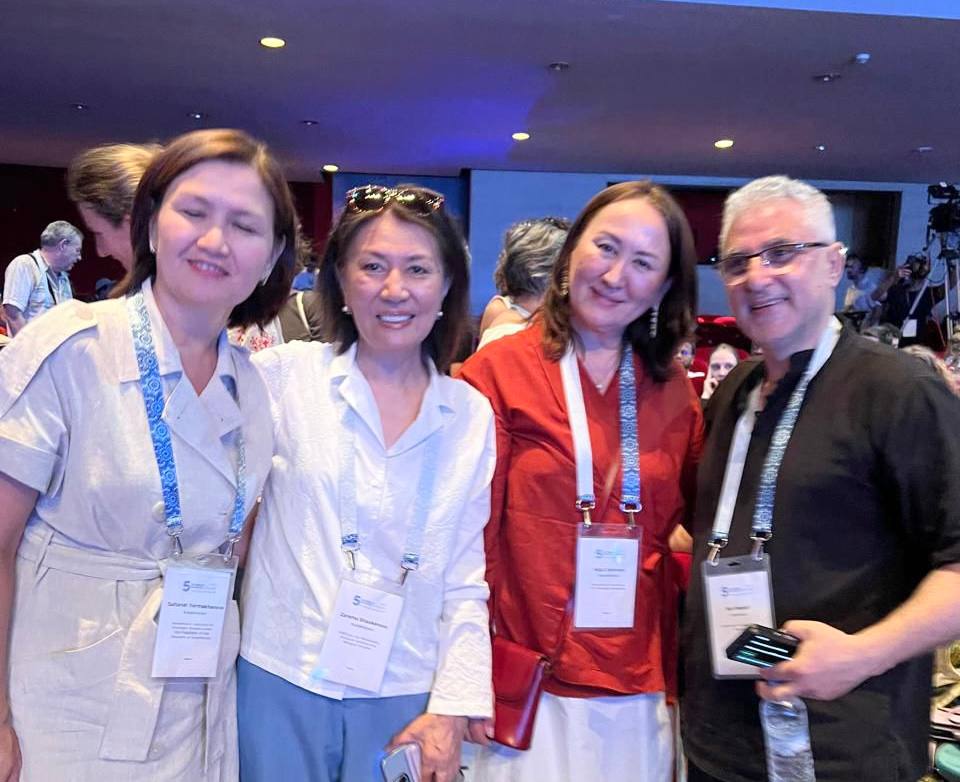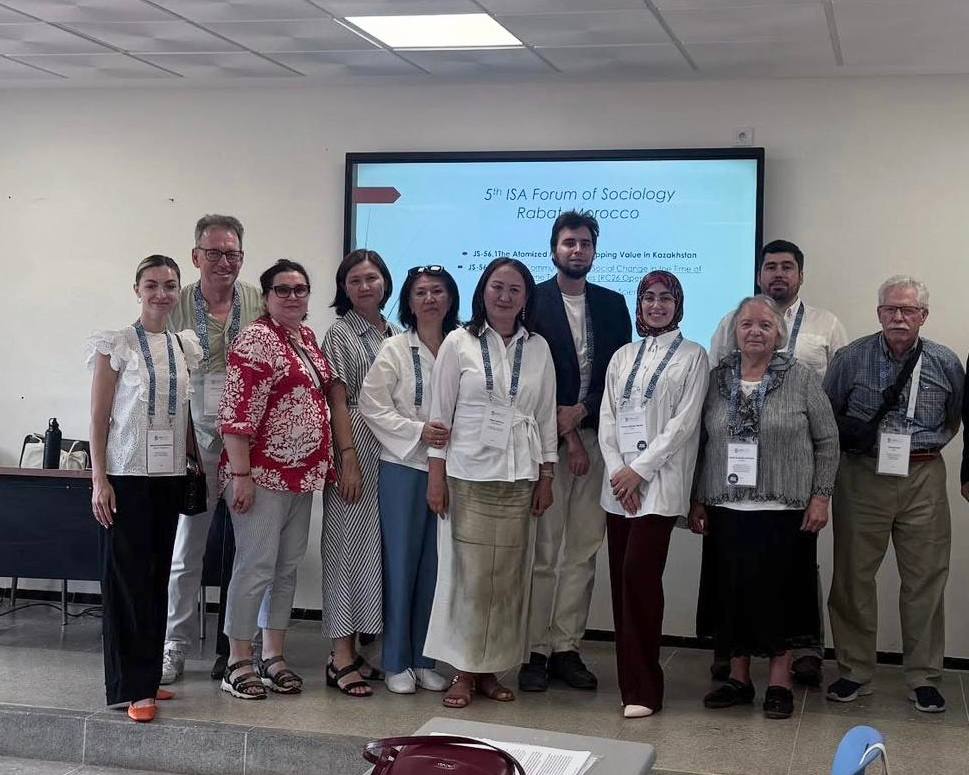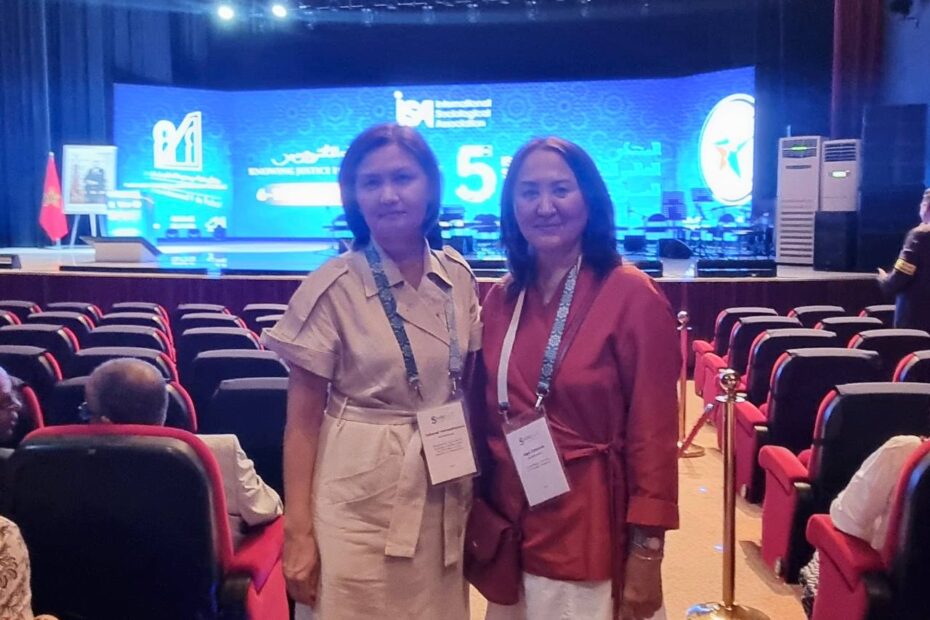Aigul Zabirova, Doctor of Sociological Sciences, Professor, Chief Research Fellow at the Kazakhstan Institute for Strategic Studies under the President of the Republic of Kazakhstan and Saltanat Yermakhanova, Head of the Department for Public Opinion Monitoring at the KazISS, and delivered presentations at the 5th Forum of the International Sociological Association (ISA) titled “Knowing Justice in the Anthropocene.” The event took place from July 6 to 11, 2025, at Mohammed V University in Rabat, Morocco.
The Forum brought together more than 4,200 scholars from over 100 countries. Leading sociological theorists discussed a broad range of issues related to the challenges of the Anthropocene – from climate justice and technological advancement to social resilience.
The Forum was organized by the International Sociological Association (ISA), which is supported by UNESCO and registered with the United Nations. This was the first time an ISA Forum was held on the African continent. The theme of the fifth Forum – “Knowing Justice in the Anthropocene” – was particularly timely. The Anthropocene is a proposed new geological epoch in which human activity has become the dominant force shaping the climate and natural environment. The organizers emphasized the need not only to study justice but to rethink it in the context of radical change: What does social justice mean in a world of depleting natural resources? How are ecological and social justice interconnected? These questions became the central theme of the Forum’s opening and closing plenary sessions.
For sociologists, participation in such events holds special significance. It is a unique platform for knowledge exchange, establishing professional connections, and fostering interdisciplinary dialogue. ISA Forums are held once every four years, alternating with the World Congress of Sociology. Notably, this year marked the first time a North African country — Morocco — hosted the Forum. Special attention was given to global challenges such as inequality, climate, and justice, all interpreted through a sociological lens.
The Forum’s program included 1,329 sessions organized by 67 ISA research committees and working groups. Events were held in various formats: plenary and sectional meetings, roundtables, poster presentations, and moderated discussions. A new feature was the thematic film screening as part of the Sociological Film Festival — a visual addition to the academic program.
Professor Aigul Zabirova delivered a presentation in the session “Conflicts. Communities. Social Change in the Age of Anthropocentric Technologies” organized by Research Committee 26 “Sociotechnics and Sociological Practice.” Her speech, titled “Mapping Value Orientations in Kazakhstan,” was based on the results of a large-scale sociological survey of over 8,000 respondents. The study focused not on demographic differences but on deep-seated belief systems — such as perceptions of justice, freedom, the role of the state, and trust. The presentation introduced an original typology of value orientations, developed using cluster analysis methods. This approach offered a new perspective on the social structure of Kazakhstani society — one that goes beyond traditional age, regional, and ethnic categories.
Saltanat Yermakhanova presented a report titled “How Do Young People Perceive the Future?” during the session “The Image of the Future as a Factor in Current Social and Political Relations in a Hybrid Reality” organized by Working Group 01 “Sociology of Local-Global Relations.” She shared the findings of a study on how young people aged 18–29 from various regions of Kazakhstan envision the country’s future in 20 years. As part of the project, focus group participants symbolically “mapped” the future Kazakhstan using nine symbolic categories: an animal, a sport, an economic sector, a profession, a building, a music genre, a tree, a color, and a state symbol.
Discourse analysis revealed that youth associate the future with images of professionalism, education, and advanced technologies. These symbols reflect a strong demand for technological development, scientific progress, and digitalization. The report emphasized the importance of considering youth perspectives in the development of public policy and strategic planning.
Both presentations sparked lively interest among Forum participants, particularly within the broader context of global discussions on the interconnection between cultural values, political engagement, and sustainable development. Kazakhstan was thus represented as a vital field for studying transformation processes in transitional societies with a rich historical and cultural heritage and active social dynamics.
The Forum was organized at a high level. Rabat, the capital of Morocco, is symbolically situated at the crossroads of four cultural spheres – Africa, the Mediterranean, the Arab world, and Europe. Mohammed V University, founded in 1957 and ranked among the region’s top universities (QS 1201–1400), served as an excellent venue for the event. Its campuses hosted sessions across four faculties – education, law, economics, and engineering – allowing for a flexible structure of parallel sessions.
It is also important to note Morocco’s principled position in maintaining neutrality and openness amid growing international academic boycotts. The country rejected discrimination based on nationality or political affiliation, demonstrating a firm commitment to academic freedom and international scientific cooperation.
Thus, the 5th ISA Forum was more than just a conference — it became a true academic festival, bringing together researchers from around the world in an atmosphere of open dialogue, intellectual freedom, and scholarly inquiry.
Aigul Zabirova,
Doctor of Sociological Sciences, Professor,
Chief Research Fellow at the KazISS




